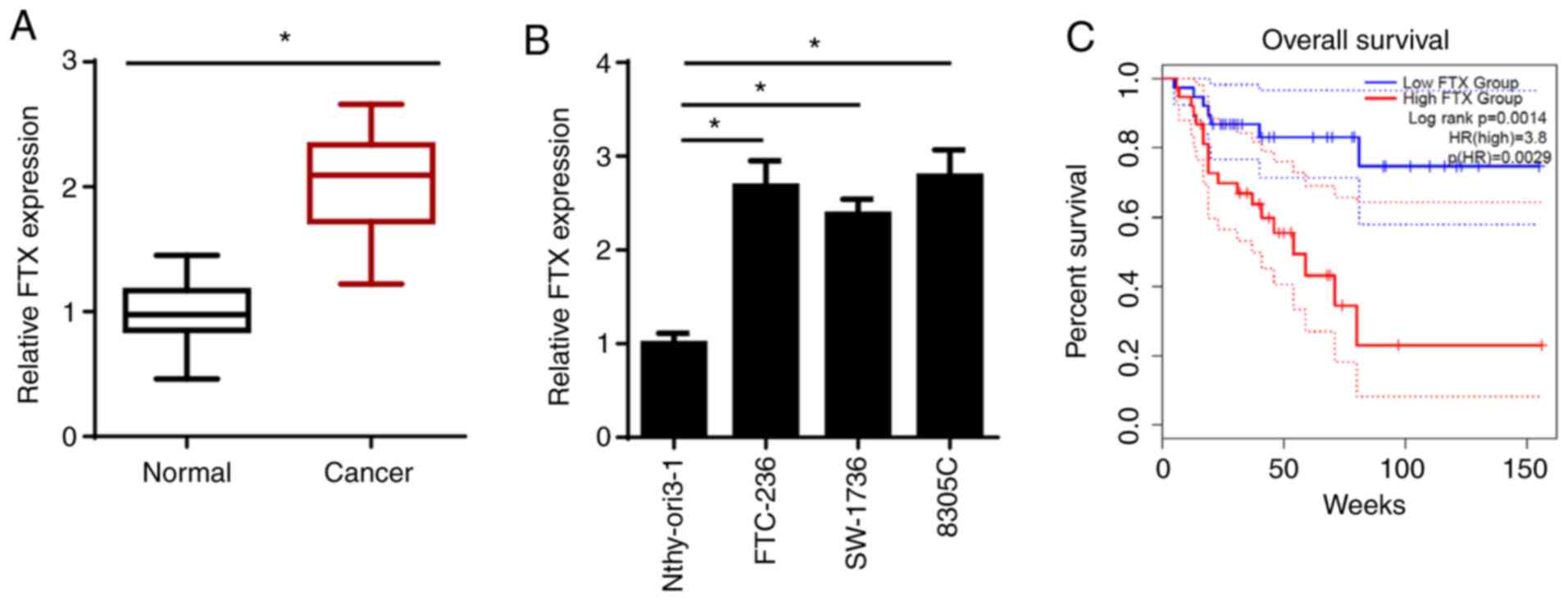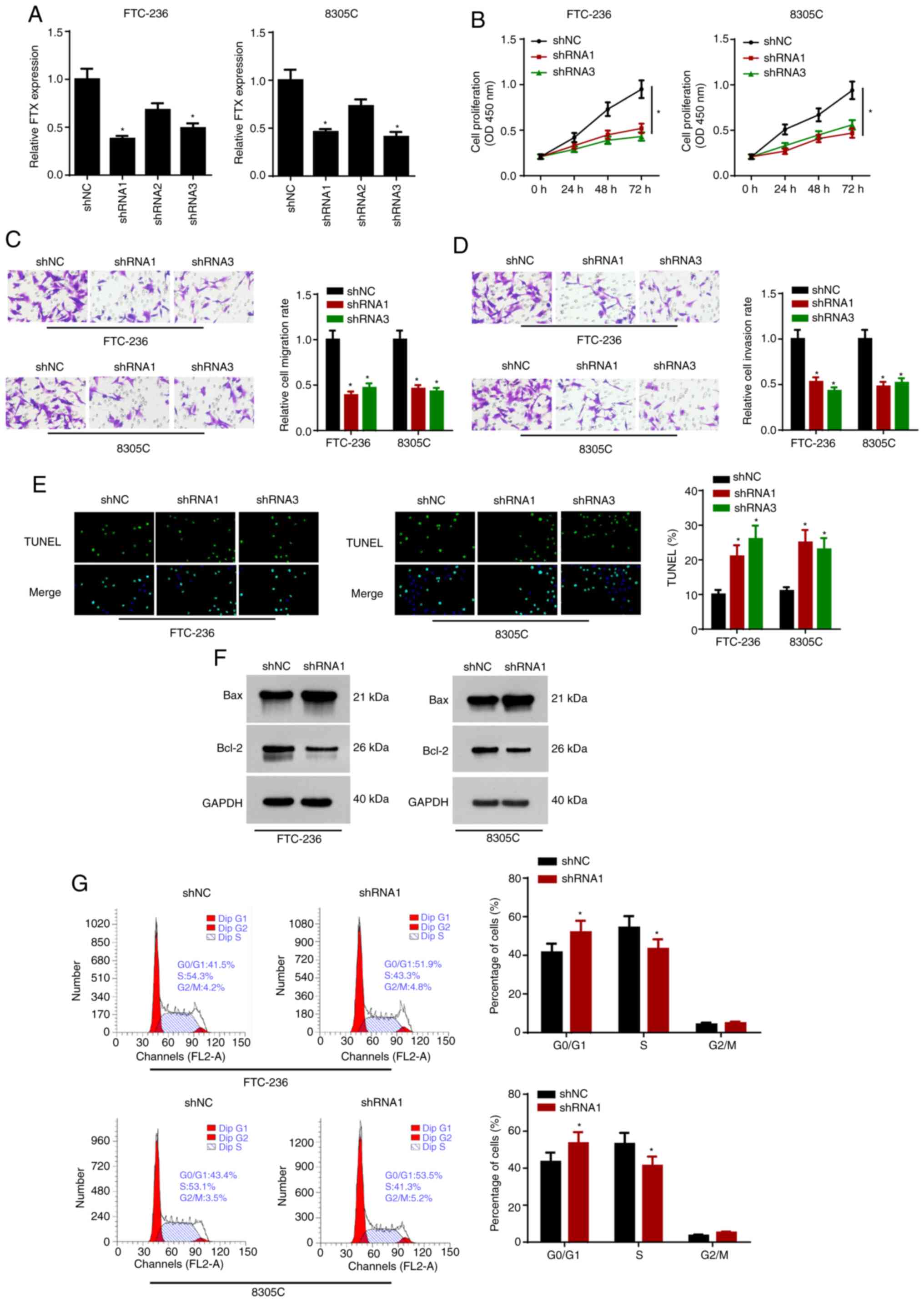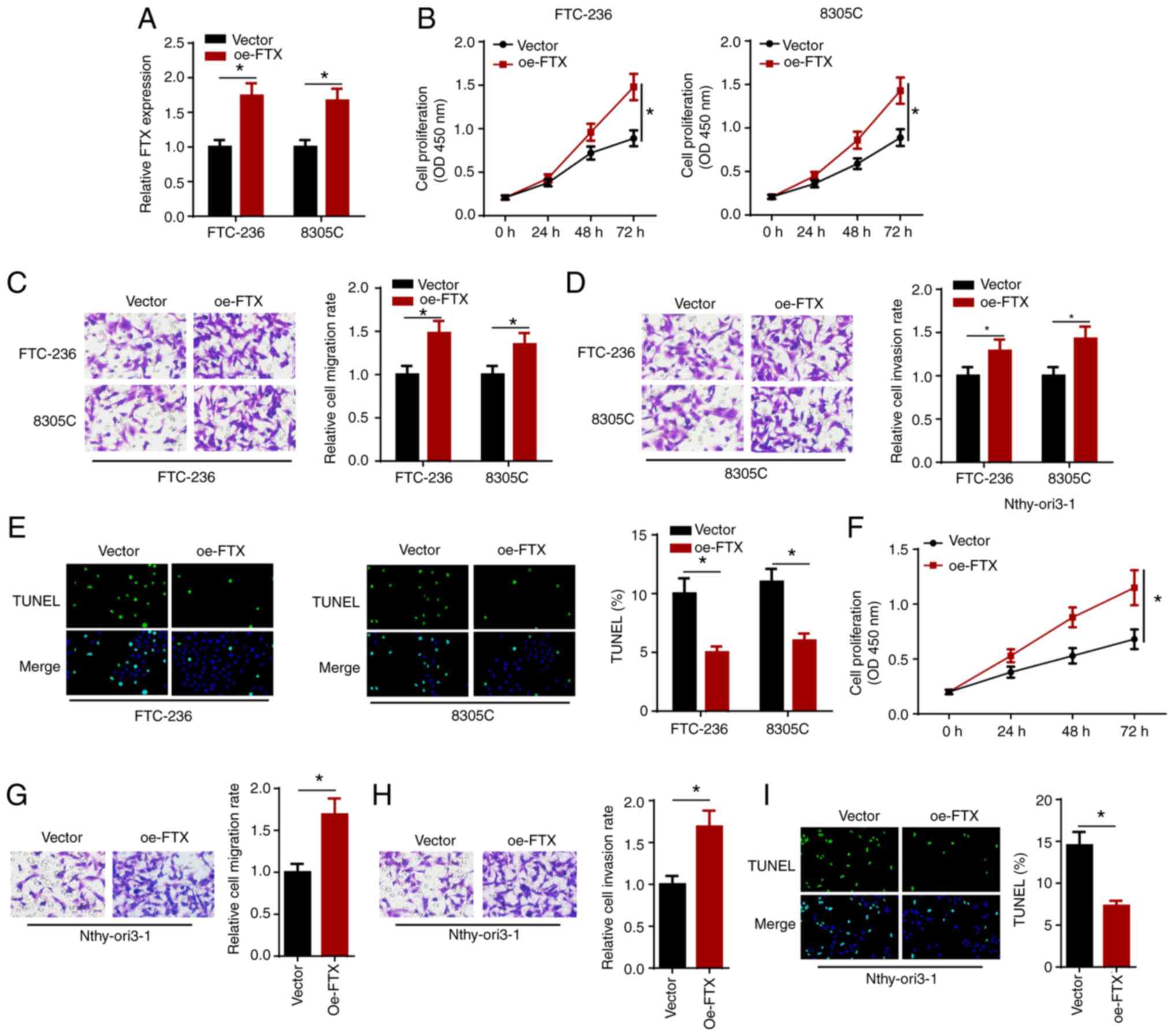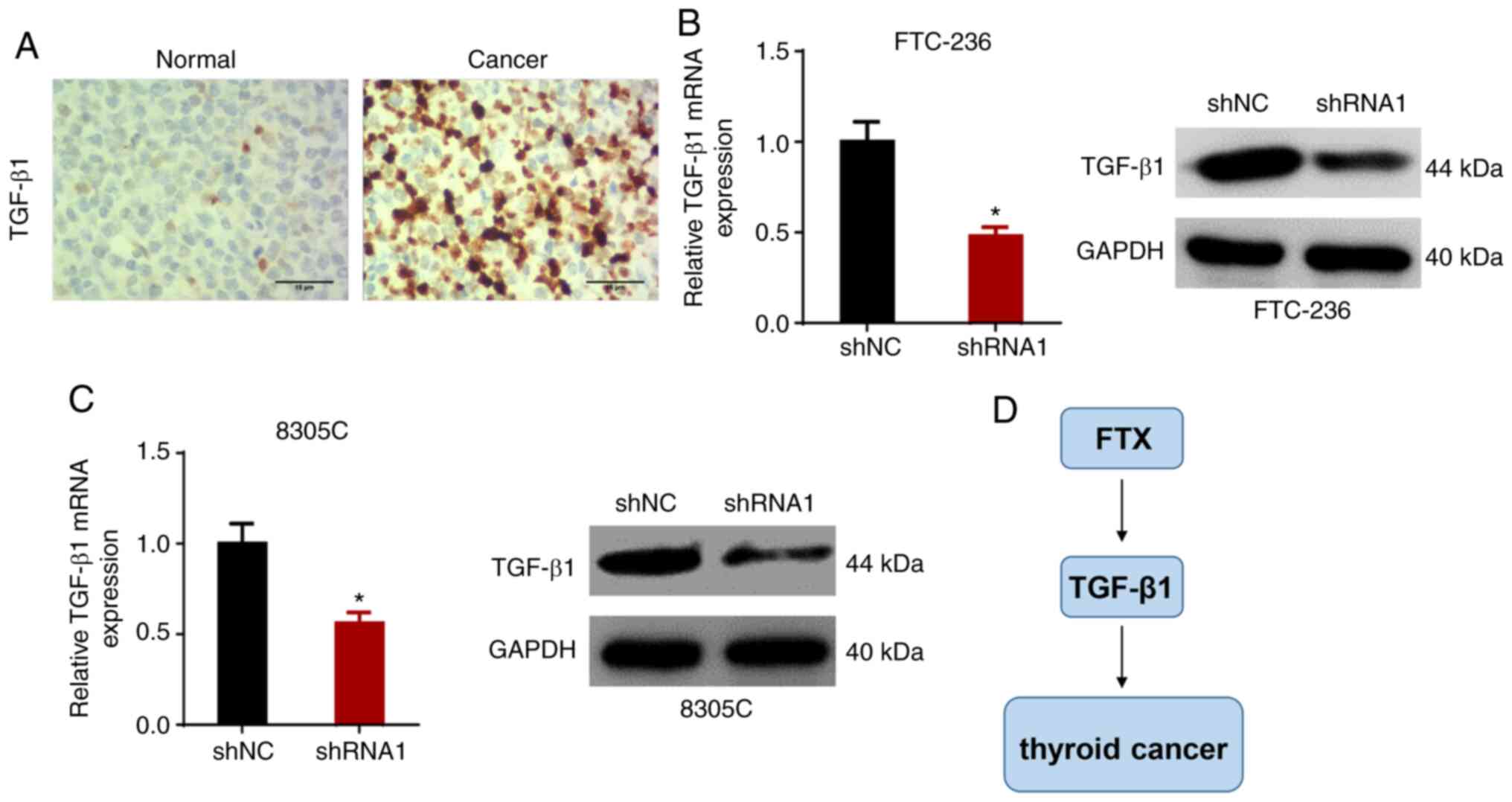|
1
|
Segev DL, Umbricht C and Zeiger MA:
Molecular pathogenesis of thyroid cancer. Surg Oncol. 12:69–90.
2003. View Article : Google Scholar : PubMed/NCBI
|
|
2
|
Ferlay J, Soerjomataram I, Siegel RL,
Torre LA and Jemal A: Global cancer statistics 2018: GLOBOCAN
estimates of incidence and mortality worldwide for 36 cancers in
185 countries. CA Cancer J Clin. 68:394–424. 2018. View Article : Google Scholar : PubMed/NCBI
|
|
3
|
Sipos JA and Mazzaferri EL: Thyroid cancer
epidemiology and prognostic variables. Clin Oncol (R Coll Radiol).
22:395–404. 2010. View Article : Google Scholar : PubMed/NCBI
|
|
4
|
Janovitz T and Barletta JA: Clinically
relevant prognostic parameters in differentiated thyroid carcinoma.
Endocr Pathol. 29:357–364. 2018. View Article : Google Scholar : PubMed/NCBI
|
|
5
|
Thompson LD, Wieneke JA, Paal E, Frommelt
RA, Adair CF and Heffess CS: A clinicopathologic study of minimally
invasive follicular carcinoma of the thyroid gland with a review of
the English literature. Cancer. 91:505–24. 2001. View Article : Google Scholar : PubMed/NCBI
|
|
6
|
Federico C, Sun J, Muz B, Alhallak K,
Cosper PF, Muhammad N, Jeske A, Hinger A, Markovina S, Grigsby P,
et al: Localized Delivery of Cisplatin to Cervical cancer improves
its therapeutic efficacy and minimizes its side effect profile. Int
J Radiat Oncol Biol Phys. 109:1483–1494. 2021. View Article : Google Scholar : PubMed/NCBI
|
|
7
|
Mohammad N, Singh SV, Malvi P, Chaube B,
Athavale D, Vanuopadath M, Nair SS, Nair B and Bhat MK: Strategy to
enhance efficacy of doxorubicin in solid tumor cells by
methyl-β-cyclodextrin: Involvement of p53 and Fas receptor ligand
complex. Sci Rep. 5:118532015. View Article : Google Scholar : PubMed/NCBI
|
|
8
|
Muhammad N, Bhattacharya S, Steele R and
Ray RB: Anti-miR-203 suppresses ER-positive breast cancer growth
and stemness by targeting SOCS3. Oncotarget. 7:58595–58605. 2016.
View Article : Google Scholar : PubMed/NCBI
|
|
9
|
Muhammad N, Bhattacharya S, Steele R,
Phillips N and Ray RB: Involvement of c-Fos in the promotion of
cancer stem-like cell properties in head and neck squamous cell
carcinoma. Clin Cancer Res. 23:3120–3128. 2017. View Article : Google Scholar : PubMed/NCBI
|
|
10
|
Liu H, Deng H, Zhao Y, Li C and Liang Y:
LncRNA XIST/miR-34a axis modulates the cell proliferation and tumor
growth of thyroid cancer through MET-PI3K-AKT signaling. J Exp Clin
Cancer Res. 37:2792018. View Article : Google Scholar : PubMed/NCBI
|
|
11
|
Huang JK, Ma L, Song WH, Lu BY, Huang YB,
Dong HM, Ma XK, Zhu ZZ and Zhou R: LncRNA-MALAT1 promotes
angiogenesis of thyroid cancer by modulating tumor-associated
macrophage FGF2 protein secretion. J Cell Biochem. 118:4821–4830.
2017. View Article : Google Scholar : PubMed/NCBI
|
|
12
|
Qin Y, Xue B, Liu C, Wang X, Tian R, Xie
Q, Guo M, Li G, Yang D and Zhu H: NLRX1 mediates MAVS degradation
to attenuate the hepatitis C virus-induced innate immune response
through PCBP2. J Virol. 91:e01264–17. 2017. View Article : Google Scholar : PubMed/NCBI
|
|
13
|
Li B, Ren P and Wang Z: Long non-coding
RNA Ftx promotes osteosarcoma progression via the epithelial to
mesenchymal transition mechanism and is associated with poor
prognosis in patients with osteosarcoma. Int J Clin Exp Pathol.
11:4503–4511. 2018.PubMed/NCBI
|
|
14
|
Zhang F, Wang XS, Tang B, Li PA, Wen Y and
Yu PW: Long non-coding RNA FTX promotes gastric cancer progression
by targeting miR-215. Eur Rev Med Pharmacol Sci. 24:3037–3048.
2020.PubMed/NCBI
|
|
15
|
Yang Y, Zhang J, Chen X, Xu X, Cao G, Li H
and Wu T: LncRNA FTX sponges miR-215 and inhibits phosphorylation
of vimentin for promoting colorectal cancer progression. Gene Ther.
25:321–330. 2018. View Article : Google Scholar : PubMed/NCBI
|
|
16
|
Liang Y and Lu H: Long noncoding RNA FTX
is associated with prognosis of glioma patients. J Gene Med.
22:e32372020. View
Article : Google Scholar : PubMed/NCBI
|
|
17
|
Jiang W, Zhang B, Sun J, Liu Y, Bi Y and
Wei H: LncRNA FTX promotes the tumorigenesis of lung adenocarcinoma
by targeting miR-300. Panminerva Med. Jan 24–2020.(Epub ahead of
print). doi: 10.23736/S0031-0808.19.03823-0.
|
|
18
|
Luzón-Toro B, Villalba-Benito L, Fernández
RM, Torroglosa A, Antiñolo G and Borrego S: RMRP, RMST, FTX and
IPW: Novel potential long non-coding RNAs in medullary thyroid
cancer. Orphanet J Rare Dis. 16:42021. View Article : Google Scholar
|
|
19
|
Livak KJ and Schmittgen TD: Analysis of
relative gene expression data using real-time quantitative PCR and
the 2(-Delta Delta C(T)) method. Methods. 25:402–408. 2001.
View Article : Google Scholar : PubMed/NCBI
|
|
20
|
Sun DY, Wu JQ, He ZH, He MF and Sun HB:
Cancer-associated fibroblast regulate proliferation and migration
of prostate cancer cells through TGF-β signaling pathway. Life Sci.
235:1167912019. View Article : Google Scholar : PubMed/NCBI
|
|
21
|
Dai G, Sun B, Gong T, Pan Z, Meng Q and Ju
W: Ginsenoside Rb2 inhibits epithelial-mesenchymal transition of
colorectal cancer cells by suppressing TGF-β/Smad signaling.
Phytomedicine. 56:126–135. 2019. View Article : Google Scholar : PubMed/NCBI
|
|
22
|
Choudhari R, Sedano MJ, Harrison AL,
Subramani R, Lin KY, Ramos EI, Lakshmanaswamy R and Gadad SS: Long
noncoding RNAs in cancer: From discovery to therapeutic targets.
Adv Clin Chem. 95:105–147. 2020. View Article : Google Scholar : PubMed/NCBI
|
|
23
|
Chan JJ and Tay Y: Noncoding RNA:RNA
regulatory networks in cancer. Int J Mol Sci. 19:13102018.
View Article : Google Scholar : PubMed/NCBI
|
|
24
|
Wen HL, Xu ZM, Wen D, Lin SY, Liang Y and
Xie JP: Long noncoding RNAs SET-binding factor 2-antisense RNA1
promotes cell growth through targeting miR-431-5p/CDK14 axis in
human papillary thyroid cancer. Kaohsiung J Med Sci. 36:808–816.
2020. View Article : Google Scholar : PubMed/NCBI
|
|
25
|
Li Q, Chen W, Luo R, Zhang Z, Song M, Chen
W, Yang Z, Yang Y, Guo Z and Yang A: Upregulation of OIP5-AS1
predicts poor prognosis and contributes to thyroid cancer cell
proliferation and migration. Mol Ther Nucleic Acids. 20:279–291.
2020. View Article : Google Scholar : PubMed/NCBI
|
|
26
|
Zheng W, Tian X, Cai L, Shen YM, Cao QS,
Yang JY and Tian GY: LncRNA DARS-AS1 regulates microRNA-129 to
promote malignant progression of thyroid cancer. Eur Rev Med
Pharmacol Sci. 23:10443–10452. 2019.PubMed/NCBI
|
|
27
|
Huo X and Wang H, Huo B, Wang L, Yang K,
Wang J, Wang L and Wang H: FTX contributes to cell proliferation
and migration in lung adenocarcinoma via targeting miR-335-5p/NUCB2
axis. Cancer Cell Int. 20:892020. View Article : Google Scholar : PubMed/NCBI
|
|
28
|
Zhang W, Bi Y, Li J, Peng F, Li H, Li C,
Wang L, Ren F, Xie C, Wang P, et al: Long noncoding RNA FTX is
upregulated in gliomas and promotes proliferation and invasion of
glioma cells by negatively regulating miR-342-3p. Lab Invest.
97:447–457. 2017. View Article : Google Scholar : PubMed/NCBI
|
|
29
|
He X, Sun F, Guo F, Wang K, Gao Y, Feng Y,
Song B, Li W and Li Y: Knockdown of long noncoding RNA FTX inhibits
proliferation, migration, and invasion in renal cell carcinoma
cells. Oncol Res. 25:157–166. 2017. View Article : Google Scholar : PubMed/NCBI
|
|
30
|
Chen H, Liu T, Ouyang H, Lin S, Zhong H,
Zhang H and Yang Y: Upregulation of FTX promotes osteosarcoma
tumorigenesis by increasing SOX4 expression via miR-214-5p. Onco
Targets Ther. 13:7125–7136. 2020. View Article : Google Scholar : PubMed/NCBI
|
|
31
|
Chen Y, Gao H and Li Y: Inhibition of
LncRNA FOXD3-AS1 suppresses the aggressive biological behaviors of
thyroid cancer via elevating miR-296-5p and inactivating
TGF-β1/Smads signaling pathway. Mol Cell Endocrinol.
500:1106342020. View Article : Google Scholar : PubMed/NCBI
|
|
32
|
Zhang X, Liu L, Deng X, Li D, Cai H, Ma Y,
Jia C, Wu B, Fan Y and Lv Z: MicroRNA 483-3p targets Pard3 to
potentiate TGF-β1-induced cell migration, invasion, and
epithelial-mesenchymal transition in anaplastic thyroid cancer
cells. Oncogene. 38:699–715. 2019. View Article : Google Scholar : PubMed/NCBI
|



















